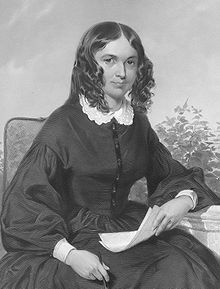
Back Elizabeth Barrett Browning AN إليزابيث باريت براونينغ Arabic اليزابيث باريت براونينج ARZ Elizabeth Barrett Browning AVK Elizabet Barrett AZ الیزابت برت براونینق AZB Элізабет Барэт Браўнінг BE Элізабэт Барэт Браўнінг BE-X-OLD Elizabeth Barrett Browning BS Elizabeth Barrett Browning Catalan
Elizabeth Barrett Browning | |
|---|---|
 | |
| Born | Elizabeth Barrett Moulton-Barrett 6 March 1806[a] Coxhoe, County Durham, England |
| Died | 29 June 1861 (aged 55) Florence, Italy |
| Occupation | Poet |
| Literary movement | Romanticism[1] |
| Spouse | |
| Children | Robert Barrett ("Pen")[2] |
Elizabeth Barrett Browning (née Moulton-Barrett; 6 March 1806 – 29 June 1861) was an English poet of the Victorian era, popular in Britain and the United States during her lifetime and frequently anthologised after her death. Her work received renewed attention following the feminist scholarship of the 1970s and 1980s, and greater recognition of women writers in English. Born in County Durham, the eldest of 12 children, Elizabeth Barrett wrote poetry from the age of eleven. Her mother's collection of her poems forms one of the largest extant collections of juvenilia by any English writer. At 15, she became ill, suffering intense head and spinal pain for the rest of her life. Later in life, she also developed lung problems, possibly tuberculosis. She took laudanum for the pain from an early age, which is likely to have contributed to her frail health.
In the 1840s, Elizabeth was introduced to literary society through her distant cousin and patron John Kenyon. Her first adult collection of poems was published in 1838, and she wrote prolifically from 1841 to 1844, producing poetry, translation, and prose. She campaigned for the abolition of slavery, and her work helped influence reform in child labour legislation. Her prolific output made her a rival to Tennyson as a candidate for poet laureate on the death of Wordsworth. Elizabeth's volume Poems (1844) brought her great success, attracting the admiration of the writer Robert Browning. Their correspondence, courtship, and marriage were carried out in secret, for fear of her father's disapproval. Following the wedding, she was indeed disinherited by her father. In 1846, the couple moved to Italy, where she lived for the rest of her life. Elizabeth died in Florence in 1861.[1][3] A collection of her later poems was published by her husband shortly after her death.
They had a son, known as "Pen" (Robert Barrett, 1849–1912). Pen devoted himself to painting until his eyesight began to fail later in life. He also built a large collection of manuscripts and memorabilia of his parents, but because he died intestate, it was sold by public auction to various bidders and then scattered upon his death. The Armstrong Browning Library has recovered some of his collection, and it now houses the world's largest collection of Browning memorabilia.[4] Elizabeth's work had a major influence on prominent writers of the day, including the American poets Edgar Allan Poe and Emily Dickinson. She is remembered for such poems as "How Do I Love Thee?" (Sonnet 43, 1845) and Aurora Leigh (1856).
Cite error: There are <ref group=lower-alpha> tags or {{efn}} templates on this page, but the references will not show without a {{reflist|group=lower-alpha}} template or {{notelist}} template (see the help page).
- ^ a b "Elizabeth Barrett Browning". Academy of American Poets. Retrieved 25 May 2018.
- ^ "Robert Wiedeman Barrett (Pen) Browning (1849–1912)". Armstrong Browning Library and Museum, Baylor University. Retrieved 25 May 2018.
- ^ Cite error: The named reference
ONDBwas invoked but never defined (see the help page). - ^ Hunt, Alan (8 October 2001). "Browning Database To Be Launched During Library's Jubilee". Baylor University. Retrieved 4 August 2021.